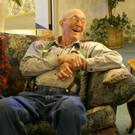Case Example
 Mr.
Smith is a 79 year old man living in an independent senior apartment. His
adult children have been increasingly overwhelmed by the level of care he needs,
and have requested a comprehensive assessment be conducted by Eldercare Consultants.
A Registered Nurse and Licensed Social Worker met with Mr. Smith and his family
to discuss how to best meet Mr. Smith’s growing needs. The following
is a proposal of the services that could be offered to Mr. Smith and his adult
children.
Mr.
Smith is a 79 year old man living in an independent senior apartment. His
adult children have been increasingly overwhelmed by the level of care he needs,
and have requested a comprehensive assessment be conducted by Eldercare Consultants.
A Registered Nurse and Licensed Social Worker met with Mr. Smith and his family
to discuss how to best meet Mr. Smith’s growing needs. The following
is a proposal of the services that could be offered to Mr. Smith and his adult
children.
Mr. Smith has a chronic history of depression, anxiety, and bi-polar disorder. His symptoms have intensified and become more frequent following the death of his wife two years ago. His symptoms of bi-polar disorder and depression increased, and Mr. Smith was hospitalized for treatment. After this episode, he was diagnosed with Leukemia, received chemotherapy, and is currently in remission. The family has identified that Mr. Smith’s depression and anxiety is one of their primary concerns. They are equally concerned with the observed signs and symptoms of dementia and memory loss that Mr. Smith has been exhibiting. The long-term goal is for Mr. Smith to experience joy and meaning in his life as he has in the past.
ElderCare Consultants (ECC) could offer assistance in reaching this goal by implementing a care plan that would address his physical, mental, and emotional needs. Due to Mr. Smith’s complex medical history, the first step would be to obtain copies of his medical records from the various facilities where he has received care. This would enable his Care Management team to gain a comprehensive understanding of his medical and psychological conditions, both past and present. The Registered Nurse would oversee this process and offer advice and consultation to ensure that Mr. Smith is receiving optimum medical care. The RN would also be available on an as-needed basis to help the family navigate a complex medical system and deal with medical needs as they arise.
Mr. Smith has been exhibiting signs and symptoms of dementia, and the family has expressed a desire for further evaluation and testing. The Care Management team would partner with the family in going through the appropriate testing, and advise family members on how to partner with doctors to obtain an accurate diagnosis. Initial dementia screening (e.g. the Mini-Mental Status Exam and Family Questionnaire) can be conducted by the ECC social worker. The social worker could also offer support and resources to the family as they work to improve Mr. Smith’s quality of life. This could include resources such as online support groups, information on the disease process, tips on enhancing communication and interactions with their loved one, or education about how to “take the journey with their parent”.
To address Mr. Smith’s depression, anxiety, and bi-polar symptoms, the care plan could include 1:1 meetings with a licensed social worker to provide counseling and socialization. Mr. Smith is resistant to seeing a therapist in a traditional setting, and believes that his depression is just a “normal” part of aging. Working with the ECC social worker would provide Mr. Smith with the mental health treatment he needs; meetings can be presented as “visits with a friend” vs. receiving therapy in a clinical setting. The social worker’s ongoing job would be to identify Mr. Smith’s personal strengths and interests, both past and present, and engage him in conversation and/or activities that are meaningful to him. The counseling will provide an opportunity for Mr. Smith to process emotions caused by the loss and transitions he has experienced, and work towards accepting and adjusting to his new life circumstances. To address Mr. Smith’s dementia, the social worker would add a psycho-educational component to address this condition. The goal would be to help Mr. Smith through the process of accepting his condition and to understand the stages of dementia. He would learn tools to cope with the disease process as it progresses and work towards improving his quality of life.
Mr. Smith and his adult children are actively seeking Psychiatric treatment for his condition, and are working to find the appropriate medications that will stabilize his condition. This will continue to be a central component to his care plan. Throughout this process, the Care Management team can partner with his adult children to monitor and record observed changes in his behavior, and communicate with the Psychiatrist and Doctors to ensure continuity of care.
Additional services or interventions may be implemented as deemed appropriate. The services offered by ElderCare Consultants Care Management Team are client-directed; the Care Manager’s role is to partner with Mr. Smith and his adult children to improve his overall well being and quality of life. Open communication between all parties is an essential component to implementing the Care Plan. This could be achieved through an email list-serve, phone calls, or group meetings when necessary. The frequency, duration, and level of services provided by ElderCare Consultants will be directed by Mr. Smith and his adult children; if the care plan and services are deemed ineffective or inappropriate, the partnership can be terminated at any time.
ElderCare Consultants takes pride in the integrity, personalized care, and quality of services we provide. We are eager to offer any assistance if and when appropriate.

